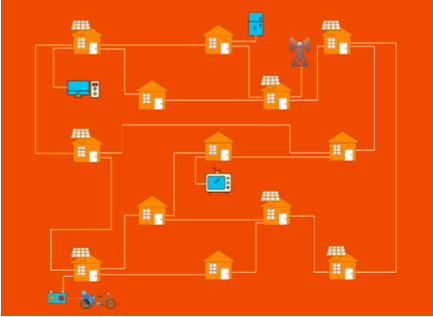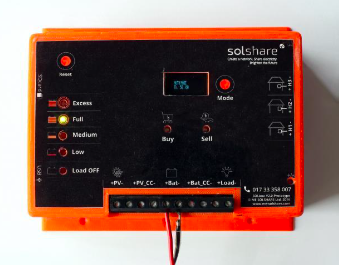Abstract
Bangladesh has been heavily reliant on fossil fuels to power the country with most power grids utilizing the surplus supply of natural gas. The increased industrialization and development have led to more stress being placed on energy generation. Natural gas alone contributes to 60% of the total energy that is generated. This has led to the country being placed 114 out of 128 in the World Energy Trilemma Index.
The country’s clean energy sector only contributes 2.95% to the overall capacity. There is an urgent need to improve the clean energy sector within the country. However, solar energy is being increasingly adopted as an alternative. In particular is an energy startup, SOLshare, an energy startup that is driving forward sustainable change by allowing people to monetize solar power, through peer-to-peer sharing of solar power through the establishment of an energy marketplace.
This case study focuses on the overall energy situation, efforts taken by Bangladesh, and the impact created by SOLshare.
This Case Study is brought to you by Nelis’ 4REVS Research Program. Nelis is an NPO with an active and expanding network of young social innovators and leaders, sustainability practitioners, and creative minds from all continents (100+ countries) that enables us to provide experiential and on-the-ground knowledge. If you want to know more or be part of our network, please leave a comment! Or contact us in www.nelisglobal.org
Overall Description

Current Energy Situation
Bangladesh utilizes fossil fuels to power its energy sector with the country having a maximum capacity of 20,000 MW. The World Bank estimates that as of 2017, Bangladesh had 88% electricity coverage.
The Sustainable and Renewable Energy Department Authority (SREDA) of Bangladesh has indicated that the country as of 2019 generated just 560 MW of electricity through renewable energy resources. As of 2019, the amount of electricity generated from renewable energy resources in comparison to the total capacity of the country is at 2.95%. The country is looking more than likely to fail in its efforts to reach a 10% clean energy target again, having already failed to reach clean energy milestones in 2015. It is placed 114 out of 128 in the World Energy Trilemma Index — an index ranking a country’s ability to provide sustainable energy based on three metrics: Energy Security, Energy Equity, and Environmental Sustainability.
The electricity generation capacity for the country is expected increase from 20,000 MW to 34,000 MW by 2030 — almost 70% — for Bangladesh to maintain steady economic growth. If renewable and clean energy is not scaled, this growth will have to be met with more fossil fuel and dirty energy powering this growth, leading to significant effects on the environmental quality of the country. Their commitments to increase clean energy capacity to 17% by 2041 and reduce greenhouse gas emissions by 5% by 2030 under the Intended Nationally Determined Contribution (INDC) will also not be achieved.
Bangladesh has started developing MOUs with neighboring nations such as Nepal and India to acquire clean energy in the form of hydroelectric power. However, to achieve a transition to a clean energy grid, the country will have to support and develop internal renewable solutions to reduce the stress of dependence on non-renewable sources of energy.
Solar Energy is on the rise in Bangladesh
Bangladesh has focused on the development of Solar Energy infrastructure in the country. Currently, Bangladesh’s solar power services 20 million people or roughly 1/8th of the population. The government has a target for 10% of the country’s electricity to be supplied by renewable energy.
Although the industrial sector is grown, Bangladesh is predominantly agriculture based. Bangladesh’s agriculture sector is powered by diesel pumps, which are often a silent contributor to Carbon Dioxide emissions. Diesel-powered pumps are estimated to produce 1.055 kg/hr of Carbon Dioxide as emission.
The development of off-grid solar installment has aided in the increase of clean energy production through the introduction of 1000 solar irrigation pumps and 13 solar mini-grids. This has resulted in 6000 farmers as of 2018 utilising cleaner solar energy-powered pumps instead of the conventional diesel-powered pumps. However, this is just 0.03% of the 16.5 million farmers in Bangladesh today. Further adoption of solar power is required to create a long-term impact and these is an urgent need within the country to not only increase the adoption of clean energy but also to reduce the pollution created as a result of intensive agricultural and industrial growth.
SOLshare is driving solar adoption in Bangladesh
SOLshare is a Bangladeshi company that looks to aid in the increased coverage of clean electricity to everyone in Bangladesh with particular focus being placed on the country’s rural population. The company has developed a system for urban and rural communities that empowers them through the creation of SOLbazaar, an energy market place. SOLshare interconnects solar home systems into solar peer-to-peer micro-grids that allow for people to monetize excess solar power in real- time.
SOLshare has engineered an ICT-enabled peer-to-peer smart grid that interconnects households through a low-voltage DC grid. The power control is established through a bi-directional metering system, which is integrated with ICT backend. The ICT backend handles payment, customer service, and remote monitoring.
Each household that has a SOLshare meter can buy and sell renewable electricity with other households in the vicinity, businesses seeking renewable electricity, and rural industries. United Nations Framework.
Convention on Climate Change estimates that SOLshare systems enable communities to reduce their annual cost of energy by 25%.
This is important as solar home systems in Bangladesh are an expensive investment and beyond the reach for many within the rural community.
Bringing down barriers for solar energy adoption for anyone
For rural households, dependent on financially dependent on agricultural land for their survival and sustenance, climate change and other external weather conditions are affecting their annual income. With SOLshare, rural communities go from being solar power users to smart entrepreneurs, who can sell surplus solar power in-return for money. The financial dividend acts as a driver against pollution since communities are now more than willing to turn towards clean energy.
The key aspect of SOLshare is the fact that a SOLshare meter can be set up in households with and without a solar home system and currently, over 4 million households are powered through SOLshare. The company seeks to serve more than 1,000,000 customers by the turn of 2030 by setting up 10,000 nano-grids.
The monetization of solar power through SOLshare has helped propel the solar power sector in Bangladesh and is a step in the right direction to improve the overall contribution of the clean energy sector.
Main features or highliths
The current Energy Capacity of Bangladesh is at 20,000 MW.
Only 560 MW of Energy is generated as a result of renewable energy sources.
Bangladesh requires 34,000 MW of energy capacity by 2030 to sustain its economic growth.
The government has a target for 10% of its electricity generation has to come from renewable energy by 2021
The agriculture sector uses diesel pumps that emit 1.055kg/hr of
Carbon Dioxide. Only a small portion of farmers have shifted to solar-powered pumps. Rural communities dependent on farming, need alternative sources of income to sustain themselves
SOLshare promotes the adoption of solar power by monetizing excess energy, and reduces energy costs by 25% annually
The startup turns customers from users to smart entrepreneurs through this monetization. This is especially important in rural communities where agriculture is the primary income, which is being increasingly affected by climate change.
Currently, 4 million households are powered by SOLshare and an additional 1 million are expected to be powered by the year 2030.
Why is this Revolutionary?
- SOLshare has established an energy marketplace called SOLbazaar, where customers can sell the excess power that is generated.
- This allows urban and rural households to capitalize on excess solar power.
- The marketplace can be utilized by businesses and industries to acquire power. As the quantity of solar power increases, businesses and industries, especially agriculture, which dominate energy consumption in Bangladesh, will be able to increasingly procure energy from these solar grids instead of fossil-fuel based power. This aspect of the energy marketplace has helped further increase the adoption of SOLshare and solar power in general.
- By allowing individuals who own solar microgrids to produce electricity and sell excess, SOLshare creates a significant incentive for people to adopt solar energy.
- SOLshare offers solar power to anyone: people not connected to the grid and reliant on polluting kerosene or biomass, or people looking for a cleaner alternative from the fossil-fuel heavy grid they utilize
- The investment to set up a solar grid is made a lot more affordable through this mechanism that allows for direct monetization of excess electricity, reducing barriers to solar energy adoption in Bangladesh.
Concrete examples
SOLshare is a Bangladeshi startup that has created a revolutionary new approach to bring affordable solar electricity to everyone in Bangladesh.
They work on the belief that smart peer to peer grids can be the future for energy utilities globally.
Website: https://www.me-solshare.com/
Key Personnel:
Sebastian Groh — Founder and Managing Director (LinkedIn: https://www.linkedin.com/in/sebastian-groh- 80549241/?originalSubdomain=bd)
Aziza Sultana — Principal, Operations (LinkedIn:
https://www.linkedin.com/in/aziza-sultana- 5334962a?originalSubdomain=bd)
Links, related resources, people behind
- SOLshare website: https://www.me-solshare.com/
- Power Division, Government of Bangladesh:
- https://powerdivision.portal.gov.bd/
- World Bank Open Data: https://data.worldbank.org/
- ME SOLshare: Peer-to-Peer Smart Village Grids | Bangladesh,
- United Nations Framework Convention on Climate Change:
- https://unfccc.int/climate-action/momentum-for-change/ict-solutions/solshare
- Hutt, Rosamond, Life for millions in Bangladesh is being transformed thanks to this simple solution, World Economic Forum, 13 January 2020: https://www.weforum.org/agenda/2020/01/bangladesh-solar- power-energy-grid-rural-life/
- Fairley, Peter, Startup Profile: ME SOLshare’s “Swarm Electrification” Powers Villages in Bangladesh, IEEE Spectrum, 27 March 2018 https://spectrum.ieee.org/at-work/start-ups/startup- profile-me-solshares-swarm-electrification-powers-villages-in- bangladesh
Article by: Suryakumar Appu, 4REVS researcher (and more)


